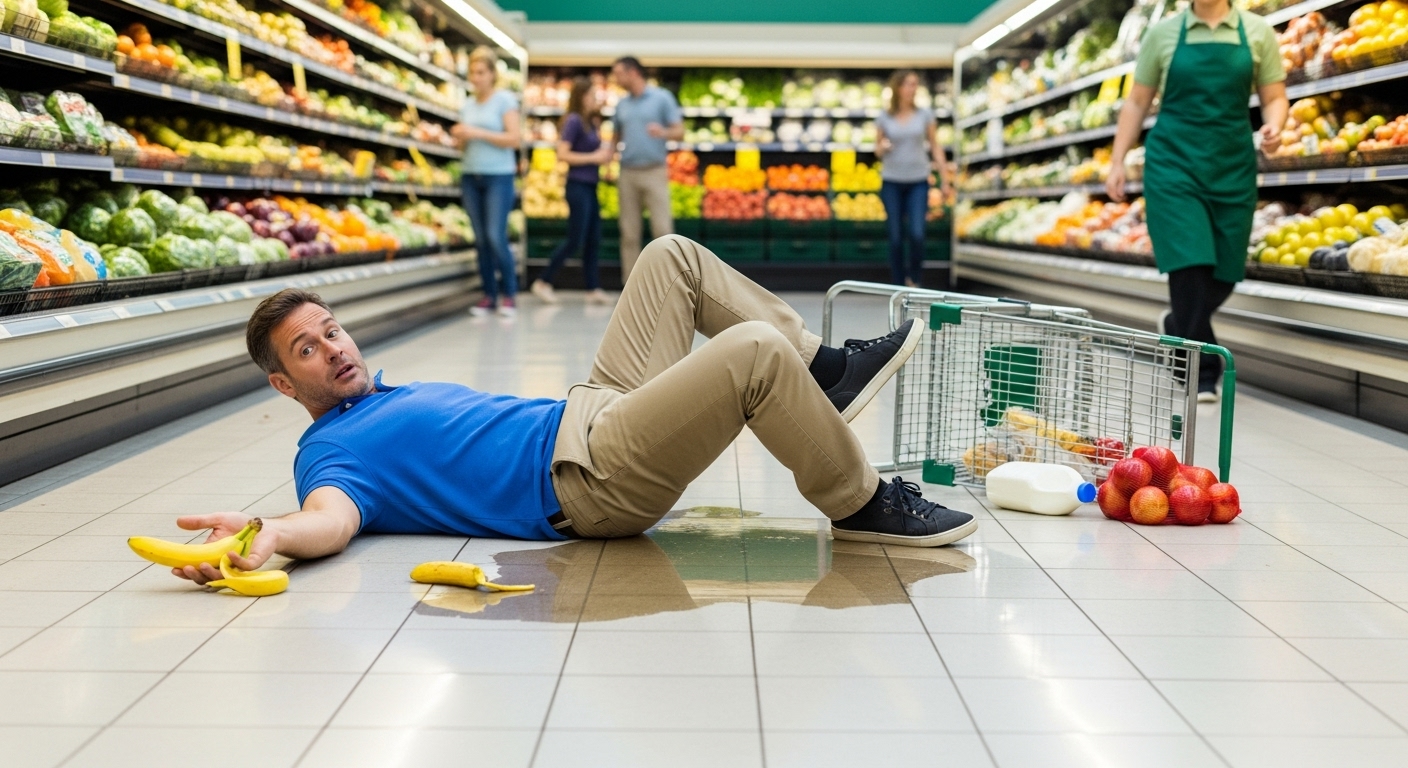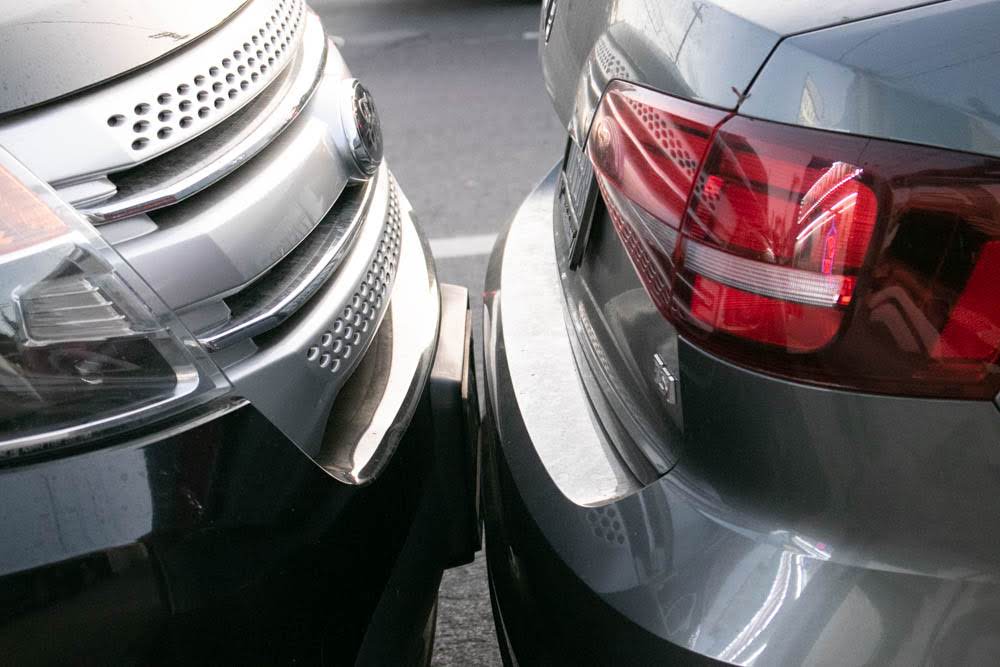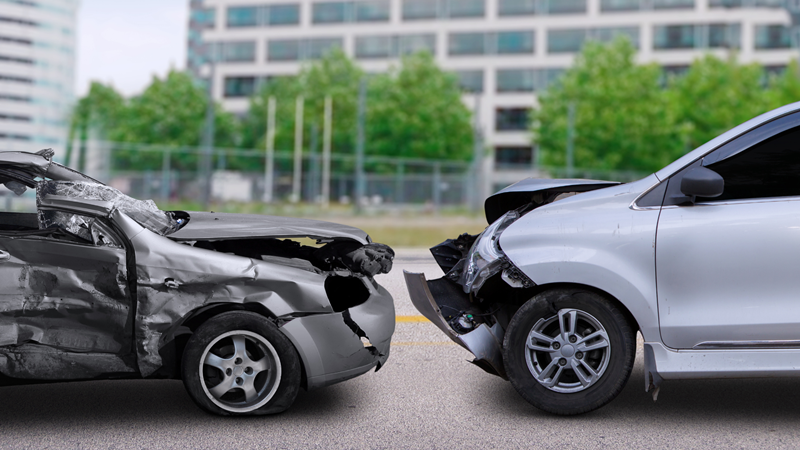Slip & Fall in Grocery Stores: Spills, Wet Floors & How to Prove Negligence
A Mississippi grocery store slip and fall lawyer helps injury victims prove negligence and recover compensation when they’re hurt due to dangerous conditions like wet floors, spills, or inadequate maintenance. These attorneys understand premises liability law and know how to gather critical evidence like surveillance footage and inspection records before stores can delete or destroy them. You need legal representation because grocery stores have teams of lawyers and insurance adjusters working immediately to minimize what they pay you.
Grocery stores must maintain reasonably safe conditions for customers, but spills from produce misters, leaking freezers, and tracked-in rainwater create serious slip hazards throughout these businesses. Proving the store knew or should have known about the dangerous condition requires specific evidence and knowledge of Mississippi’s comparative negligence laws. Store owners often try to blame customers for falls or claim they had no notice of hazards, making experienced legal representation essential for protecting your rights.
This guide explains how to prove grocery store negligence, what evidence strengthens your case, and how Mississippi law protects injured shoppers seeking fair compensation.
Do I Need a Mississippi Grocery Store Slip and Fall Lawyer?
Yes, you need a lawyer after a grocery store fall that causes injury. Grocery stores have teams of lawyers and insurance adjusters working immediately to protect the store and minimize what they pay you. Without legal representation, you’re fighting an uphill battle against professionals whose job is to deny or reduce your claim.
The good news is that a slip and fall lawyer Mississippi works on contingency fees. This means you pay nothing upfront and we only collect a fee if we win your case. Time is critical because stores often delete security video within days of an incident.
You definitely need legal help if any of these situations apply:
- Store won’t cooperate: They refuse to provide incident reports or claim surveillance video doesn’t exist
- Serious injuries occurred: Medical bills exceed a few thousand dollars or you missed work
- Store denies fault: They blame you for the accident or claim they had no knowledge of the hazard
- Insurance lowballs you: The adjuster offers a settlement that doesn’t cover your medical bills
What Is a Grocery Store Slip and Fall?
A grocery store slip and fall is a premises liability claim. This means you’re injured on store property because of a dangerous condition the store knew about or should have discovered. Mississippi law requires property owners to keep their stores reasonably safe for customers.
When stores fail to maintain safe conditions, they can be held legally responsible for your injuries. The key is proving the store was negligent in maintaining their property or warning customers of hazards.
What Causes Slips and Falls in Grocery Stores?
Grocery stores create unique slip hazards because of constant foot traffic, food displays, and refrigeration systems. Many falls happen because of temporary dangers that employees should monitor and clean up quickly.
How Do Rainy Entrances and Mats Create Risk?
Rainy weather turns store entrances into slip zones. Customers track in water that pools on floors or saturates entrance mats. Wet mats can slide under your feet, and water spreads beyond the mat area.
Stores must use adequate floor mats and post visible wet floor signs during rainy conditions. They also need to mop frequently and inspect entrance areas every few minutes when weather is bad.
Where Do Spills and Leaks Happen Most in Stores?
Certain store areas are accident hotspots where spills occur regularly:
- Produce sections with water misters and dropped fruits
- Dairy aisles where milk containers leak or break
- Frozen food sections with condensation from freezer cases
- Checkout lanes where customers drop drinks
- Deli areas with grease and food particles on floors
Do Freezers and Coolers Create Condensation Hazards?
Yes, malfunctioning refrigeration units frequently leak water or create condensation. This clear liquid is nearly invisible on most flooring, making it extremely dangerous. The water often appears suddenly when equipment cycles on and off.
Stores must maintain their refrigeration equipment and immediately clean up any leaks. They should also inspect these areas frequently since condensation can appear without warning.
What Duty Does a Mississippi Grocery Store Owe to Shoppers?
Mississippi law classifies grocery shoppers as invitee status under Mississippi law. This gives you the highest level of legal protection when you’re on store property. The store owes you a duty to inspect, maintain, and warn of all hazards they know about or should discover.
This duty is proactive, not reactive. Stores can’t simply claim they didn’t know about a spill. They must prove they took reasonable steps to find and fix potential dangers.
Here’s how Mississippi law protects different types of visitors:
| Visitor Type | Legal Status | Store’s Duty |
|---|---|---|
| Shoppers | invitee status under Mississippi law | Must inspect for, fix, and warn of all hazards |
| Social guests | Licensee | Must warn of known hazards only |
| Trespassers | No legal right | Must avoid intentional harm |
How Do I Prove a Grocery Store Was Negligent?
You must prove the grocery store was negligent to win your case. Mississippi law provides three ways to do this. You only need to prove one method to have a valid claim.
What Is Actual Notice in a Store Slip and Fall?
Actual notice means the store or its employees knew the specific hazard existed before you fell. This is the strongest type of evidence because it shows direct knowledge.
We can prove actual notice through employee reports, customer complaints, or surveillance video showing workers walking past the spill. Sometimes we find evidence in the store’s radio communications or incident logs.
What Is Constructive Notice in Mississippi?
Constructive notice means the hazard existed long enough that the store should have found it through reasonable inspections. We don’t need to prove anyone actually saw the spill, just that it was there long enough to be discovered.
Evidence includes dirty footprints through a spill, shopping cart tracks, or dried edges around liquid. These signs prove the hazard wasn’t fresh when you fell.
What If an Employee Created the Hazard?
When store employees cause the dangerous condition, the store is automatically liable. You don’t need to prove notice in these cases because the store created the problem.
Common examples include employees dropping products while stocking, leaving boxes in aisles, or mopping without posting warning signs. The store is responsible for training employees to work safely.
What Evidence Proves a Mississippi Grocery Store Slip and Fall?
Strong evidence makes or breaks your case, but it disappears quickly. Stores often delete video and lose paperwork, so you must act fast to preserve proof of what happened.
How Do We Get and Preserve Store Surveillance Video?
We immediately send the store a legal preservation letter demanding they save all evidence related to your fall. This includes surveillance footage from multiple cameras that may have captured different angles of the incident.
Many stores routinely overwrite or delete surveillance video after a short period. Some systems overwrite recordings under a 72-hour video retention policy. Our preservation letter creates legal liability if they destroy evidence after receiving it.
What Are Sweep Logs and Inspection Policies?
Sweep logs are internal records showing when employees checked specific store areas for hazards. These documents prove whether the store followed its own safety policies and how long hazards may have existed.
We obtain these records through legal discovery. They often reveal that stores skip inspections or falsify records, which strengthens your case significantly.
Do Incident Reports and Witnesses Matter?
Incident reports are crucial evidence, even when stores try to minimize what happened. Always insist that management file a report and get a copy before leaving the store.
Witness information is equally important. Get names and phone numbers of other customers who saw you fall or noticed the hazard. Their testimony can prove how obvious the danger was.
Should I Keep My Shoes and Photograph the Scene?
Yes, preserve everything you were wearing when you fell. Your shoes may show traces of the substance that caused your slip, which helps prove what made the floor dangerous.
Take photos of the exact spot where you fell from multiple angles. Capture any warning signs or the lack of them. Document the substance on the floor and any damage to your clothing.
How Do I Document Medical Treatment for My Claim?
Seek medical attention immediately, even if you feel fine. Adrenaline can mask serious injuries, and some conditions like concussions have delayed symptoms.
Follow all your doctor’s recommendations and keep every medical record and bill. Missing appointments or ignoring treatment recommendations hurts your case because it suggests your injuries aren’t serious.
What Injuries Are Common After a Grocery Store Fall?
Falls onto hard tile floors cause devastating injuries. The impact force can break bones and damage internal organs. We regularly see clients with:
- Broken bones: Wrists, arms, hips, and ankles from trying to break the fall
- Head injuries: Concussions and brain trauma from striking the floor or shelving
- Spinal damage: Herniated discs and nerve damage from twisting during the fall
- Soft tissue injuries: Torn ligaments, severe sprains, and deep muscle damage
Some injuries don’t show symptoms immediately but can cause permanent disability. This is why medical evaluation is essential even when you think you’re okay.
What Compensation Can I Recover in Mississippi?
You can recover compensation for all losses caused by your fall. A grocery store accident lawyer helps calculate the full value of your claim, including both economic and non-economic damages.
Mississippi has no cap on damages for actual economic (compensatory) damages in slip and fall cases. This means there’s no legal limit on what you can recover for serious injuries. This is the replacement for the previous text.
Your compensation typically includes:
- Economic damages: All medical bills, lost wages, and future earning capacity
- Non-economic damages: Pain and suffering, emotional distress, and loss of life enjoyment
- Future costs: Ongoing medical care, physical therapy, and home modifications
What Factors Affect Case Value?
Several factors determine your potential settlement amount. Insurance companies evaluate each element when deciding how much to offer:
- Injury severity: Permanent disabilities and ongoing medical needs increase value significantly
- Clear liability: Strong evidence of store negligence leads to higher settlements
- Lost income: Higher earners recover more for missed work and reduced earning capacity
- Age and health: Younger victims with longer life expectancy receive more compensation
- Medical costs: Higher treatment expenses justify larger settlement demands
What If the Store Says the Fall Was My Fault?
Don’t worry if the store blames you for the accident. This is a standard defense tactic that doesn’t prevent you from recovering compensation.
Mississippi uses pure comparative negligence rules. You can still collect damages even if you were partially at fault, but your recovery reduces by your percentage of blame.
For example, if you were 20% at fault for looking at your phone, you can still recover 80% of your total damages. Even significant fault doesn’t eliminate your right to compensation.
How Long Do I Have to File in Mississippi?
Mississippi’s statute of limitations gives you three years from your fall date to file a lawsuit. However, waiting too long seriously damages your case because evidence disappears and witness memories fade.
Some government-owned properties have much shorter deadlines. Municipal stores or facilities may require notice within 90 days of your accident.
A Mississippi slip and fall attorney ensures all deadlines are met while building the strongest possible case for you.
How Much Does a Slip and Fall Lawyer Cost?
Maloney-Lyons Personal Injury and Car Accident Lawyers represents all personal injury clients on contingency fees. You pay nothing upfront and we only collect fees if we win your case.
We advance all case costs including expert witnesses, court filing fees, and investigation expenses. If you don’t recover compensation, you owe us nothing.
Our fees are a percentage of your total settlement or verdict. This arrangement ensures we’re motivated to get you the maximum possible recovery.
Don’t Wait Protect Your Rights Now
The grocery store and its insurance company are already building their defense against your claim. They’re reviewing video, interviewing employees, and looking for ways to blame you for the accident.
You need experienced legal representation immediately to level the playing field. Our offices in Biloxi and Mobile serve clients throughout Mississippi, Alabama, Florida, and Georgia.
At Maloney-Lyons Personal Injury and Car Accident Lawyers, you work directly with experienced attorneys David J. Maloney and T. Randall Lyons, not case managers or junior staff. We handle every aspect of your case personally from initial consultation through final settlement.
Contact us today for a free consultation. We’ll evaluate your case, explain your rights, and start protecting your interests immediately.
Frequently Asked Questions
Do Grocery Stores Have to Give Me Surveillance Video?
No, stores won’t voluntarily release security footage. An attorney must send legal preservation demands and may need to file a lawsuit to obtain video evidence.
How Long Do Grocery Stores Keep Security Camera Footage?
Surveillance footage is often retained only for a short time, so it’s important to act quickly to preserve it.
Should I Sign the Store’s Incident Report?
You should report your fall and review the incident report for accuracy, but never give recorded statements to insurance adjusters without legal representation.
Will Medical Payments Coverage Pay My Bills Immediately?
Many stores carry medical payments coverage that can help pay initial medical expenses regardless of fault. This coverage typically ranges from $5,000 to $10,000 for initial medical expenses.
Can I Still Sue If Another Customer Caused the Spill?
Yes, the store remains liable if they knew or should have discovered the spill through reasonable inspections. Who created the hazard doesn’t matter if the store failed to clean it up.
Does Wet Weather Affect My Case If I Fell Near the Entrance?
Stores have heightened duties during bad weather including adequate floor mats, frequent mopping, and prominent wet floor signs. Rainy conditions don’t excuse store negligence.
Will Using My Phone While Shopping Hurt My Claim?
Phone use might contribute to comparative fault but doesn’t prevent compensation recovery. Unless you were completely distracted, it typically has minimal impact on case value.
Why Should I Keep the Shoes I Wore During My Fall?
Your footwear is important evidence that may contain traces of the substance that caused your slip. This physical evidence helps prove what made the floor dangerous and supports your negligence claim.





